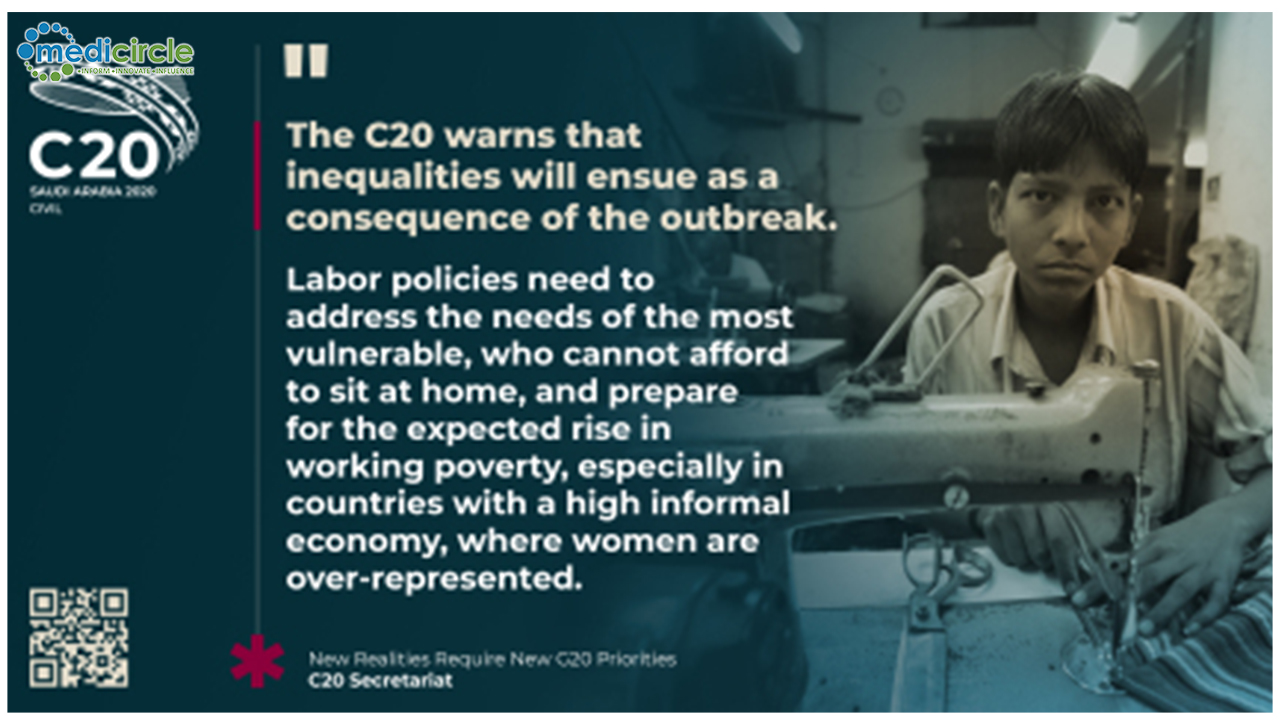The events of this year alone, starting with the bushfires in Australia and moving to the outbreak of COVID-19, underscored the ever-growing complexity of our global shared challenges and expose the weaknesses of the current dominant economic system, and how it deepens inequalities between individuals and countries. We ask that G20 leaders recognize our new global reality and reorient this year’s G20 priorities towards building a more resilient global governance.
G20 leaders need to uphold the principles of human rights, civic engagement, and democracy. As the crisis develops, the C20 observes with great alarm the continued deterioration of the situation for many vulnerable groups in different societies. Governments must protect and extend medical care to all people without leaving anyone behind.
The infodemic surrounding the disease is equally fatal to the virus. The C20 stands in solidarity with communities suffering as a result of different governments’ lack of transparency. Governments are accountable in their response to the crisis, and work on empowering local communities and civil society actors in responding to the outbreak.
We can learn from previous public health emergencies the importance of quality care continuum, protection of human rights, anti-discrimination and isolation of people living with the diseases and affected communities. COVID-19 is a sobering reminder that we need to increase investment in what we know works: strong international partnerships, building health care delivery systems that reach everyone, research and development, and an approach to care that prioritizes the most marginalized. The C20 urges that G20 leaders consider the recommendations in the statement on pandemic preparedness released jointly with the Business 20, Labor 20, Think 20, Women 20 and Youth 20.
Another emerging lesson out of this emergency, is that hyper-globalization of our supply chains is making our trade systems extremely vulnerable to shocks. The C20 cautions G20 leaders against the ongoing attempts in trade agreement negotiations to open “health markets” to foreign investors and competition, turning health systems into yet another investment opportunity. We worry that the divide between those who can afford healthcare and those who cannot will be exacerbated.
The C20 warns that inequalities will ensue as a consequence of the outbreak. Labor policies need to be put in place to address the needs of the most vulnerable, who cannot afford to sit at home, and prepare for the expected rise in working poverty, especially in countries with a high informal economy, where women are over-represented.
The world is in need of multilateral coordination of an effective response to the economic crisis that provides adequate fiscal and monetary stimulus, while safeguarding liquidity from misuse by speculative activities. A fairly designed stimulus package should take into account not only the interest of businesses and SMEs, but also households, workers, and the most vulnerable.
A problem with multiple dimensions requires a solution by multiple actors. Members of Civil Society and humanitarian NGOs continue to face tightened financial restrictions due to risk and cost aversion by banks in complying with FATF regulations. Such financial exclusion limits our ability to respond to global emergencies.
We implore the G20 Leaders to take immediate action in responding to the substantial impact on education and the dwindling prospects of ensuring access. The world is entirely unequipped to maintain a promise of “education for all”; particularly in contexts where classrooms can no longer provide a safe environment for learning.
The C20 calls on G20 leaders to expand this year’s G20 priorities to vigilantly respond to the changes in the labor market through expanding social protection systems, ensure digital and eLearning is accessible across, prioritize child online safety, address rising risks to debt sustainability in emerging markets as they face urgent financing needs to improve health systems capacity to respond to the COVID-19 outbreak, including debt relief and attending to their exposure to volatile capital flows.
Civil Society 20 (C20) is one of the eight official Engagement Groups of the G20. It provides a platform of Civil Society Organizations around the world to bring forth a non-government and non-business voice.

 Civil Society 20 (C20) is one of the eight official Engagement Groups of the G20. It provides a platform of Civil Society Organizations around the world to bring forth a non-government and non-business voice.
Civil Society 20 (C20) is one of the eight official Engagement Groups of the G20. It provides a platform of Civil Society Organizations around the world to bring forth a non-government and non-business voice.








.jpeg)




.jpeg)






.jpeg)









.jpg)


.jpg)
